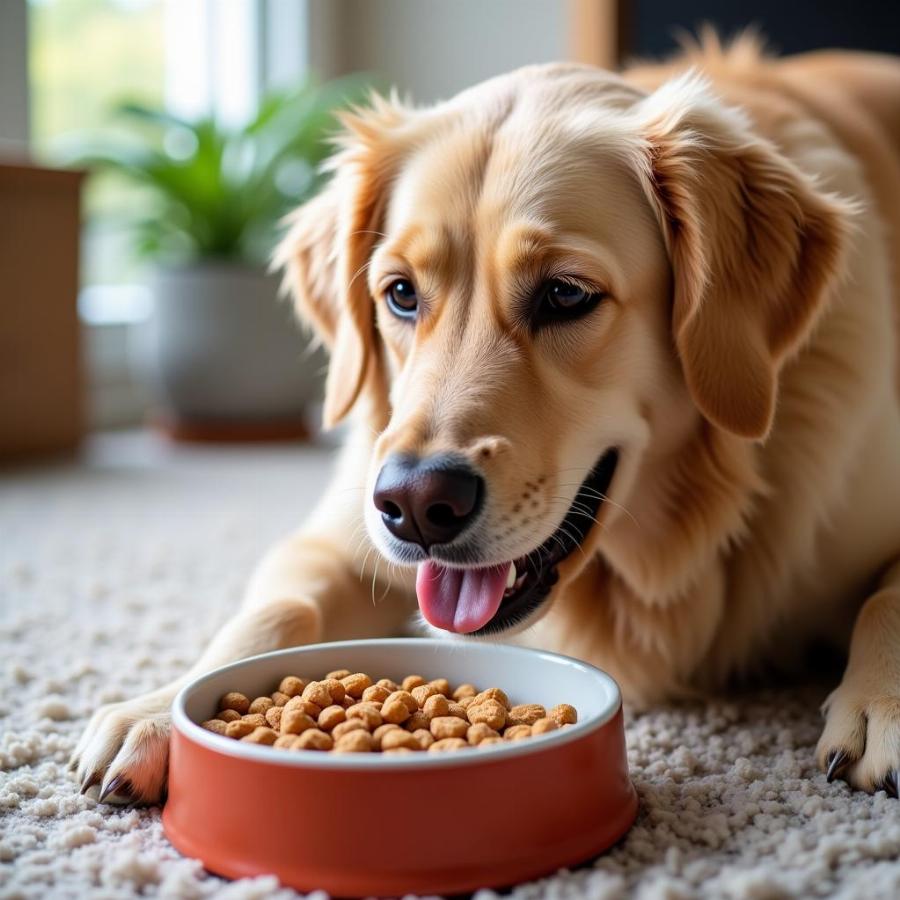Choosing the right food for your senior dog is crucial for their overall health and well-being. As dogs age, their nutritional needs change, and soft kibble can be an excellent option to support these changes. Soft kibble dog food for seniors offers a palatable and easily digestible alternative to traditional dry kibble, helping to ensure your furry friend gets the nutrients they need to thrive in their golden years. This guide will explore the benefits of soft kibble, how to choose the right one, and answer your frequently asked questions.
Why Choose Soft Kibble for Senior Dogs?
Senior dogs often experience dental issues, making chewing hard kibble painful or even impossible. Soft kibble provides a much gentler option for aging jaws and teeth, allowing them to eat comfortably and without discomfort. Additionally, as dogs get older, their digestive systems can become more sensitive. Soft kibble is easier to break down, promoting better digestion and nutrient absorption. This is especially important for senior dogs who may be prone to digestive upset. Many senior dogs also experience a decreased appetite. The enticing aroma and palatable texture of soft kibble can often stimulate their interest in food, helping them maintain a healthy weight and get the nourishment they need.
 Senior Dog Enjoying Soft Kibble
Senior Dog Enjoying Soft Kibble
Key Nutrients to Look for in Soft Kibble for Seniors
When choosing soft kibble for your senior dog, it’s essential to look for a formula specifically designed for their age and needs. These formulas often contain higher levels of certain key nutrients: Glucosamine and chondroitin support joint health, crucial for senior dogs prone to arthritis and other joint issues. Antioxidants, such as vitamins E and C, help protect cells from damage caused by free radicals, supporting overall health and longevity. Fiber aids in digestion and helps prevent constipation, a common problem in older dogs. Look for soft kibble with moderate fiber content. High-quality protein sources are crucial for maintaining muscle mass, which can decline with age. Look for soft kibble with easily digestible protein sources like chicken, turkey, or fish.
Transitioning Your Senior Dog to Soft Kibble
Switching your senior dog to soft kibble should be a gradual process to avoid digestive upset. Start by mixing a small amount of soft kibble with their current food. Gradually increase the proportion of soft kibble over several days until they are eating it exclusively. Monitor your dog closely during the transition period for any signs of digestive issues, such as vomiting or diarrhea.
What is the Best Soft Kibble Dog Food for Senior Dogs?
The “best” soft kibble depends on your individual dog’s needs and preferences. Consult with your veterinarian to determine the ideal formula for your senior dog based on their health, breed, and activity level. They can help you choose a food that addresses any specific dietary needs or health concerns.
Is Soft Kibble Good for Senior Dogs With Missing Teeth?
Yes, soft kibble is often a great option for senior dogs with missing teeth or dental problems. Its softer texture makes it much easier to chew and swallow, even without a full set of teeth.
Conclusion
Soft kibble dog food for seniors can significantly improve their quality of life by making mealtime more enjoyable and ensuring they receive the necessary nutrients for optimal health. By considering factors like ingredients, nutritional content, and your dog’s individual needs, you can choose the best soft kibble to help them thrive in their golden years.
FAQ
-
Can I mix soft and dry kibble for my senior dog? Yes, you can mix soft and dry kibble, especially during the transition period.
-
Is soft kibble more expensive than dry kibble? Soft kibble can sometimes be slightly more expensive than dry kibble due to its higher moisture content and specialized formulas.
-
How do I store soft kibble? Store soft kibble in a sealed container in a cool, dry place to maintain its freshness.
-
Can puppies eat senior soft kibble? No, puppies should eat puppy food formulated for their specific nutritional needs. Senior soft kibble is not appropriate for growing puppies.
-
What if my senior dog doesn’t like soft kibble? Try different brands and flavors to find one your dog enjoys. You can also try warming the kibble slightly or adding a small amount of low-sodium broth to make it more appealing.
Further Reading
- iams canned dog food
- best senior dry dog food
- best dog food for sensitive stomachs
- best wet dog food for senior dogs
Beaut Dogs is your trusted source for all things related to dog care, offering expert advice and valuable information to help you provide the best possible care for your canine companion. When you need assistance, contact us at [email protected] (Email address) for detailed and accurate answers. Beaut Dogs is dedicated to helping you navigate the world of dog ownership, providing expert insights into breed characteristics, nutritional needs, training tips, and much more, so you can enjoy a happy and healthy life with your beloved dog.